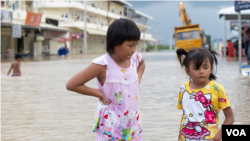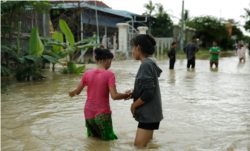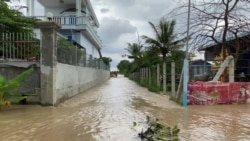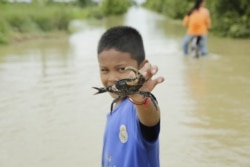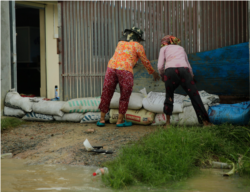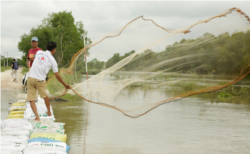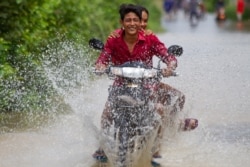Saom Sreypov, a garment worker, saved whatever she could from her wages and accumulated $38,000 over time.
She used that nest egg to buy an apartment in a project supervised by Borey Sansimex, one of hundreds of developers in Cambodia’s capital, Phnom Penh, and surrounding provinces.
Her apartment is on Street 217, which connects Phnom Penh’s western districts to the new international airport about 30 kilometers south of the city. The apartment’s location suggested it would increase in value as the district grew into its economic potential.
“It is a developing area with more new property projects coming in,” Saom Sreypov said. An added plus: “I really liked it.”
Saom Sreypov spoke with VOA Khmer while waiting to collect whatever was saved from the apartment after she fled Wednesday night as floodwaters submerged her neighborhood in the wake of tropical storms.
Usually, it is the Mekong River that floods parts of Cambodia, but the current floods came when the Prek Thnot overflowed after a tropical storm dumped torrents of rain. The flooding forced thousands of residents to evacuate from gated communities in southwestern and southern Phnom Penh.
The water came up to Saom Sreypov’s neck.
“I never ever expected [the area] could be flooded by Prek Thnot,” Saom Sreypov said as she sat in front of the Prey Chrey Market in Phnom Penh’s Dangkor district. “I have no idea how to fix it as I have already settled down here.”
She spoke while watching brown water flow along Street 217, an artery once thick with large trucks and hustling pedestrians.
Seun Vannak, 32, spent about $12,000 on a plot of land — 5 by 20 meters — inside the Borey VIP development two years ago.
He built a home for his son, his wife and his parents.
As of Wednesday, it was uninhabitable.
“I could not believe how fast it could flood,” Seun Vannak said. “I had never seen anything like this in two years of living here.”
It took only two hours on Wednesday for a dry street to be submerged under 1 meter of water, Seun Vannak said. By Thursday evening, the water reached his chest.
“I feel sorry as many of our household appliances are now gone,” he said.
Nationwide, the Prek Thnot flooding ran 280 kilometers from Kampong Speu down to Kandal and Phnom Penh. Nineteen provinces across the country have been severely affected by flooding after incessant rains in the past week. As of Saturday, at least 24 people have died, more than 26,500 have been evacuated from their homes, and 219,000 have been affected by the flooding, according to the National Committee for Disaster Management (NCDM).
The government dispatched hundreds of uniformed army and naval forces with speedboats to help evacuate people from their homes.
Water Resource Ministry’s Secretary of State Chan Youttha said the flooding was severe but that the flooding was not linked to the Mekong River, as was the case with extreme flooding in the past.
“As of now we observe this as a large-scale [flood] caused by rainfall, but flooding from the Mekong River is not happening — unlike in 2011 and 2013 when floods were caused by both rainfall and Mekong spillover,” he said earlier this week.
Outside the capital region, 120,000 hectares of farmland have been flooded so far, including 80,000 hectares of rice fields, according to NCDM.
The Water Resource Ministry warned that more tropical storms are expected to cause additional flooding from Sunday through Tuesday.
Dangkor district is the only area in Phnom Penh affected by the Prek Thnot flood, said municipal administration spokesman Met Measpheakdey.
“The most important thing now is to save people’s lives from the affected areas, which means we have to first bring them out of the flooded areas to a higher land,” he told VOA Khmer.
Other residents like Klauk Vanna, who bought a flat in Borey VIP in 2019, said he lost all of his belongings.
“I was told it would be safe from flooding here, but after one year of moving in, and it’s now flooded, I feel disappointed,” said the 52-year-old repairman.
Many Cambodian citizens took to Facebook to say the flooding was exacerbated by the government’s filling of lakes, especially in Phnom Penh.
These views were reflected in a July report issued by four NGOs which showed that the filling of the Boeung Tumpun area in southern Phnom Penh would put 1 million people at risk of flooding. The lake is being reclaimed for a satellite city, which is being developed by several prominent businesses and tycoons.
Of Phnom Penh’s 25 natural lakes, 16 have been filled in as of 2019, according to the study.
Alejandro Gonzalez-Davidson, founder of Mother Nature Cambodia, said the current flooding was an ostensible example of the dangers of filling the country’s lakes.
“We also sincerely hope that the Hun Sen regime learns from what is happening and puts an end to all plans to fill in more lakes and wetlands, not just in Phnom Penh but in other cities, too,” Gonzalez-Davidson said.
Prime Minister Hun Sen rejected the notion that lake filling and flooding were linked during a visit late Thursday night to the flooded areas of Dangkor district.
Hun Sen said the flood was a natural, not man-made, disaster.
“I do not want to respond to anyone. I only want to explain to the people,” he said.
Saom Sreypov said that she didn’t know if the filled-in lakes had anything to do with the floods.
“I do not know, so that I prefer not to say anything because I fear it could be sensitive. … The only thing I have to do is that whenever it’s flooded, I have to move.”




